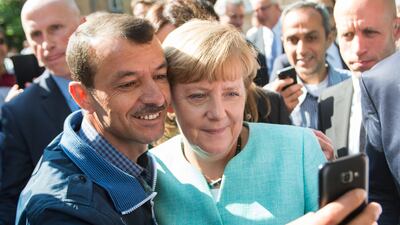Former German chancellor Angela Merkel has been awarded the UN refugee agency's Nansen Award for her government's decision to grant asylum to more than one million refugees from Syria and the Middle East.
The UNHCR selection committee hailed Ms Merkel's “leadership, courage and compassion” in Germany's decision to welcome 1.2 million refugees and asylum seekers in 2015 and 2016.
At the time, the woman who led the German government for 16 years said the situation “put our European values to the test as seldom before”.
“It was no more and no less than a humanitarian imperative,” she added.
The UN refugee agency highlighted how she had called on her fellow Germans to reject divisive nationalism, urging them instead to be “compassionate and open-minded”.
“By helping more than a million refugees to survive and rebuild, Angela Merkel displayed great moral and political courage,” UN refugee commissioner Filippo Grandi said in a statement, hailing her determination to stand up for human rights, humanitarian principles and international law.
“It was true leadership, appealing to our common humanity, standing firm against those who preached fear and discrimination,” he said.
The selection committee highlighted that, in addition to protecting people forced to flee war, Ms Merkel was the driving force behind Germany's collective efforts to receive them and help them integrate into society.
The annual Nansen Award was created in 1954 in honour of the first UNHCR, Norwegian Arctic explorer and humanitarian Fridtjof Nansen, to mark outstanding work on behalf of refugees.
It honours people, groups and organisations for going above and beyond the call of duty to protect refugees and other displaced and stateless people.
Ms Merkel will receive her award and the $150,000 in prize money at a ceremony in Geneva on October 10. Four regional winners will also be honoured at that ceremony, each receiving a $50,000 prize.

They include Nagham Hasan, an Iraqi gynaecologist who provides medical and psychosocial care to Yazidi girls and women who survived enslavement, rape and other violence at the hands of extremist groups in northern Iraq.
Also on the list is the Mbera Fire Brigade — a volunteer refugee firefighting group in Mauritania that has extinguished more than 100 bushfires and planted thousands of trees.
Meikswe Myanmar, a humanitarian group that helps internally displaced people and others in need in the conflict-torn country, was also awarded a prize, as was Vincenta Gonzalez, who established a cacao cooperative in Costa Rica to support refugees and host-community women, including survivors of domestic violence.
Pointing out that the number of forcibly displaced people around the world has passed 100 million for the first time this year, the UNHCR statement said it was “imperative that the public retain their sense of compassion towards those forced to flee their homes”.
This year marks a century since Nansen was awarded the 1922 Nobel Peace Prize for his efforts to repatriate prisoners of war and to protect millions of refugees displaced by conflict, revolution and the collapse of the Russian, Ottoman and Austro-Hungarian empires.
It also marks 100 years since the creation of the Nansen passport, an identity document for refugees, making it possible for them to move across borders in search of work, UNHCR said.


